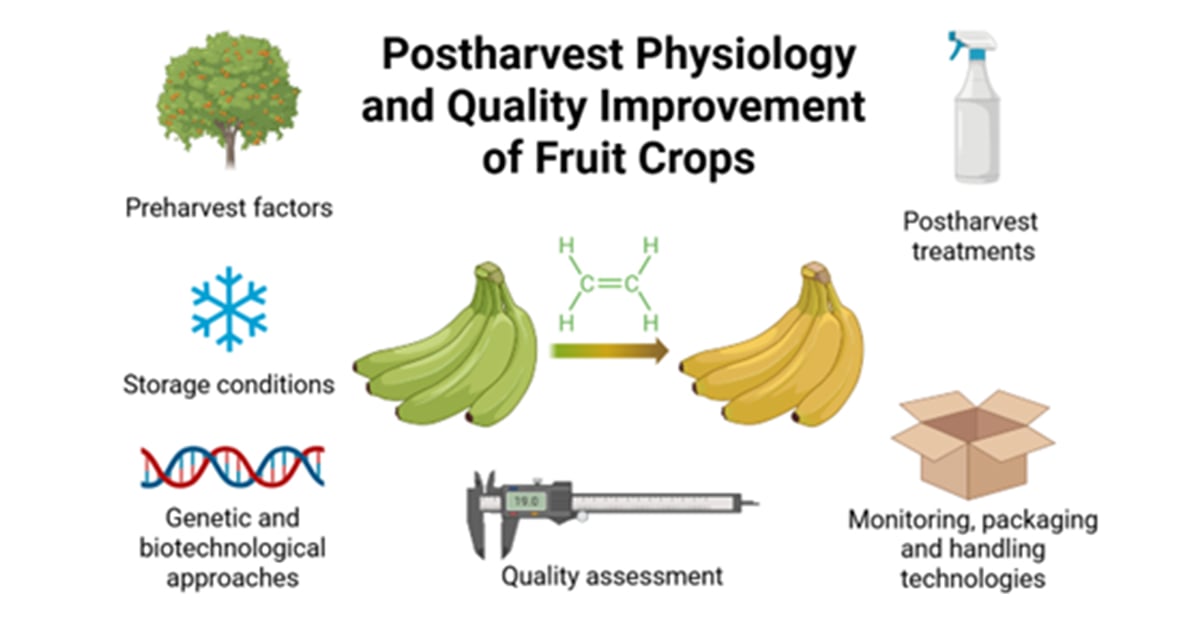- 3.0Impact Factor
- 5.1CiteScore
- 18 daysTime to First Decision
Postharvest Physiology and Quality Improvement of Fruit Crops
This special issue belongs to the section “Fruit Production Systems“.
Special Issue Information
Dear Colleagues,
Ensuring fruit quality from harvest to consumption remains a central challenge in horticultural science. The postharvest period plays a crucial role in determining the final quality, nutritional value, and marketability of fruit crops. As global demand for high-quality fresh produce increases, understanding the physiological, biochemical, and molecular mechanisms involved in fruit development, ripening, and senescence has become more important than ever.
The Special Issue “Postharvest Physiology and Quality Improvement of Fruit Crops” aims to gather original research and comprehensive reviews focused on innovations in postharvest biology, handling technologies, storage methods, and treatments that extend shelf life, reduce losses, and enhance fruit quality. Topics of interest include, but are not limited to, physiological responses to storage conditions, postharvest treatments (chemical, physical, or biological), and genetic or biotechnological approaches to enhance shelf life, preserve nutritional and sensory attributes, and reduce postharvest losses. Contributions exploring preharvest factors affecting postharvest behavior, novel monitoring, packaging and handling technologies, natural or synthetic postharvest treatments, and quality assessment methods are particularly welcome. This Special Issue seeks to provide valuable insights for researchers, producers, and supply chain stakeholders striving to improve fruit quality and extend their marketability in a sustainable manner.
Dr. João Claudio Vilvert
Dr. Sergio Tonetto de Freitas
Guest Editors
Manuscript Submission Information
Manuscripts should be submitted online at www.mdpi.com by registering and logging in to this website. Once you are registered, click here to go to the submission form. Manuscripts can be submitted until the deadline. All submissions that pass pre-check are peer-reviewed. Accepted papers will be published continuously in the journal (as soon as accepted) and will be listed together on the special issue website. Research articles, review articles as well as short communications are invited. For planned papers, a title and short abstract (about 250 words) can be sent to the Editorial Office for assessment.
Submitted manuscripts should not have been published previously, nor be under consideration for publication elsewhere (except conference proceedings papers). All manuscripts are thoroughly refereed through a single-blind peer-review process. A guide for authors and other relevant information for submission of manuscripts is available on the Instructions for Authors page. Horticulturae is an international peer-reviewed open access monthly journal published by MDPI.
Please visit the Instructions for Authors page before submitting a manuscript. The Article Processing Charge (APC) for publication in this open access journal is 2200 CHF (Swiss Francs). Submitted papers should be well formatted and use good English. Authors may use MDPI's English editing service prior to publication or during author revisions.
Keywords
- postharvest physiology
- fruit quality
- fruit ripening
- shelf-life extension
- postharvest treatments
- ripening and senescence
- storage methods
- quality assessment
- preharvest factors

Benefits of Publishing in a Special Issue
- Ease of navigation: Grouping papers by topic helps scholars navigate broad scope journals more efficiently.
- Greater discoverability: Special Issues support the reach and impact of scientific research. Articles in Special Issues are more discoverable and cited more frequently.
- Expansion of research network: Special Issues facilitate connections among authors, fostering scientific collaborations.
- External promotion: Articles in Special Issues are often promoted through the journal's social media, increasing their visibility.
- e-Book format: Special Issues with more than 10 articles can be published as dedicated e-books, ensuring wide and rapid dissemination.

